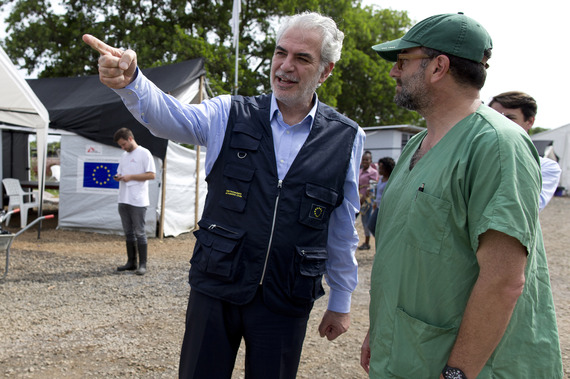
Remember the headlines and the panic about Ebola last year?
While the daily news in Europe and America no longer covers the disease compared to the height of the outbreak, Ebola in West Africa is not over. Yes, reported cases are much lower compared to 12 months ago. And we have to salute the amazing work done by health workers from the affected countries and from around the world in the front line who have brought the numbers down. But their fight goes on: people are still getting infected. People are still dying.
Entire families have been decimated, children orphaned, fragile and under funded health systems have been shattered by an outbreak of an unprecedented scale.
The disease continues to kill: mostly in Guinea and Sierra Leone, but now again in Liberia, where the virus has reemerged two months after the country was declared Ebola-free.
Today in New York the world is coming together to pledge resources for the recovery of Sierra Leone, Guinea and Liberia. And this is support they need urgently. But it will also be an occasion to sound the alarm bell that the emergency response to the epidemic must not wane now.
Especially since it's proving more difficult to bring cases down from 20 cases per week to 0 cases, than it was to bring them from 300 cases per week to 50.
This is partly because despite the heroic efforts of local and international medical teams, we still need to raise awareness and get more local people on board. Safe burial practices need to continue. Communities need to buy into the collective effort to beat Ebola. The epidemic will not be defeated in the treatment centres alone - essential though they are.
There are also stark lessons to be learnt in terms of the response and preparedness.
In the early months of the outbreak, the international community relied on the heroic effort of one organization - Médecins Sans Frontières (MSF). The first to recognize the seriousness of the epidemic; the first to respond on the ground. But it is not sustainable to let a single organization do the heavy lifting in fighting an outbreak like the one we have seen. There needs to be a much broader base for the global response. Medical teams, epidemiologists, community workers. And there is no doubt that the World Health Organisation needs to be better prepared to respond to future threats. But this will not happen overnight.
We also need to recognize the high price and scale of the job that medical teams have faced since the beginning. They couldn't do a job in tougher conditions, but when I visited the three most affected countries myself in November 2014, I also saw the remarkable courage and determination of those involved in the response.
It's important that while the disease remains a threat we must look beyond the emergency as well. To boost the support of the international community for the national plans for recovery and return to sustainable development.
The epidemic has had shattering effects on the people and the economies of all three countries and we need to help them get back on their feet. Maternal and perinatal healthcare has been badly affected, and the vaccination of children and the treatment of patients with chronic illnesses have been disrupted. Thousands of malaria cases may have gone untreated with fatal consequences, as many people held back from seeking medical help for fear of contracting Ebola. We must help rebuild these health systems and make them more resilient.
From the outset, the European Union (EU) mobilized its resources to help fight the epidemic: funding medical organizations to treat and isolate the sick, deploying experts and mobile laboratories, providing transport and coordination of vital goods and equipment and operating a medical evacuation mechanism for all international health workers.
The EU has also supported medical research to develop new treatments, tests and vaccines. In all, the European Commission and the EU Member states have made available close to €1.4 billion for humanitarian aid, for longer-term development assistance and for research. Today in New York, we are pledging an additional €450m in support for the three countries. We will also continue to fund the response and preparedness in the three affected countries. And we are working with our Member States to build up a standby pool of European medical and other experts, available to respond at short notice to future crises.
History shows us that the virus does not go away for good. In countries like Uganda or the Democratic Republic of Congo, it has shown a tendency to come back. We need to make sure that countries are better prepared the next time an epidemic strikes, with capacity and systems in place across the region ready to contain and respond quickly and effectively. At international level we all need to remain focused and coordinated. The responsibility is collective.
This is in the interest of everyone, worldwide; everywhere. Diseases like Ebola know no borders.
Preventing a tragedy like this must be a common global fight.
